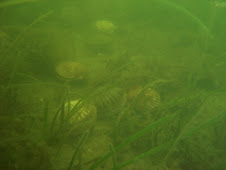
Apparently, climate change might not be such a bad thing. Especially not if you are an exploited species of bivalve. Now I am not trying to be a climate change apologist, but too often we get caught up in this debate and science is 99% of the time on the side saying "It's bad." However, as I have learned in my own research with invasive species, there are always two sides to every coin. A warming ocean could be a benefit to numerous species, probably as many species as it might be of detriment. Obviously, there are a whole suite of ecosystem processes that are also affected, but in certain cases, it might not be so bad. At least not according to a paper in Marine Biology entitled "Strengthening recruitment of exploited scallops Pecten maximus with ocean warming." Its an interesting read. The essential idea is that over a long(ish) time period, the researchers were able to demonstrate a highly significant correlation between increasing temperature and increasing settlement and recruitment of juvenile scallops to a local scallop population. Shifts in recruitment can be attributed to temperature related shifts in feeding, gonad development and larval survival - and this impacts are more apparent in species who use environmental cues to induce development and spawning. Such is the case for many species of bivalves, including scallops, and so a warming ocean could potentially enhance scallop recruitment. There are some stats involved in their methods, but the basic results are pretty simple, over the past decade, scallop landings around the Isle of Man have been increasing. IN addition, mean springtime temperatures have been increasing (which cues development). I know what you all might be thinking, correlation does not equal causation (you know the one, mean global temperature has increased as the number of global pirates has decreased, meaning that the number of pirates somehow influences the climate), but that goes into their methods of using residuals and proxy values and all sorts of things. Basically, recruitment increase isn't significantly related to other things (spawning stock, dissolved oxygen, chlorophyll a), and is strongly related to temperature. They even examined a number of scallops during the three month conditioning period and the GSI - which indicates relative gonad development - was significantly higher in years when temperature was higher. So when temperature goes up, the scallops develop larger gonads and subsequently release more larvae which show up as strong recruitment classes.
So what does this mean for bay scallops? Well, there are plenty of issues with ocean warming and bay scallops - and one of particular concern is predator range expansion and new predators coming into the bay scallops range. In terms of recruitment, we haven't seen any patterns that would suggest this is the case in New York. However, there hasn't been many scallops here to spawn over the past 20 years until recently - due to the restoration efforts - and there needs to be a local spawning population in order to observe any of the patterns described from the paper. That said, bay scallop recruitment is not likely to be effected by ocean warming in terms of larger populations - although timing of first spawn might change, the number of times they spawn might change, etc, but it is my opinion that there are numerous variables that influence the size of recruitment classes in local scallop populations, particularly in the bay, which is already a dynamic environment.
Shephard, S., Beukers-Stewart, B., Hiddink, J., Brand, A., & Kaiser, M. (2009). Strengthening recruitment of exploited scallops Pecten maximus with ocean warming Marine Biology, 157 (1), 91-97 DOI: 10.1007/s00227-009-1298-7















No comments:
Post a Comment